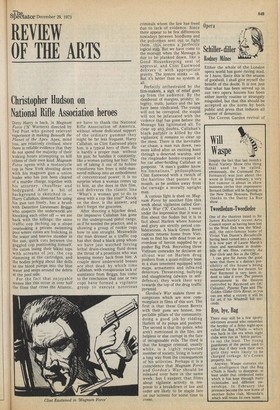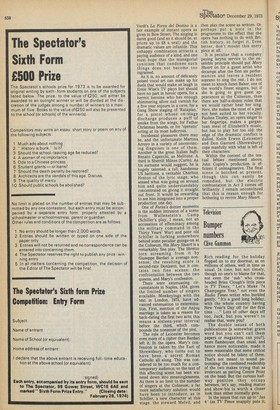Christopher Hudson on National Rifle Association heroes
Dirty Harry is back, in Magnum Force ('X' Warners) directed by Ted Post who gained relevant experience in making Beneath the Planet of the Apes. Apes, mind you, are relatively civilised, since there is reliable evidence that they do not spend the majority of their waking hours attempting to kill others of their own kind. Magnum Force opens with a motorcycle cop in New York shooting down With his magnum gun a union leader who has just been cleared of a murder charge, together with his attorney, chauffeur and bodyguard. After a bit of background is sketched in — Harry Callahan, demoted for using his gun too freely, has a brush With Detective Lieutenant Briggs Who suspects the underworld are knocking each other off — we are back with the killings: the same traffic cop inching .up a slope overlooking a private swimming Pool where cuties are frolicking in the water and heavies slumber in the sun, quick cuts between the goggled cop positioning himself, the cuties losing their bikini tops With screams of joy, the cop slamming in the cartridges, and the bodies jerkg about like dolls as the blood pumps into the blue water and seeps around the debris at the pool side.
For the fact that enjoyable scenes like this occur in over half the films that cross the Atlantic, we have to thank the National Rifle Association of America, without whose dedicated support of the ordinary gunman they might be far less frequent. Harry Callahan, as Clint Eastwood plays him, is a typical hero of them. He is hardly a proper man without his gun; he handles it constantly, like a woman patting her hair. The act of taking it out of its holster transforms him from a mild-mannered milksop into an embodiment of concentrated power; it is no surprise when a woman comes up to him, as she does in this film, and deliveres the classic line "What's a woman got to do to sleep with a cop like you?" Knock on the door, is the answer, and don't forget the groceries.
After shooting a hijacker dead, the impassive Callahan has gone to the underground pistol range, as if he needed the practice, and is showing a group of rookie cops how to aim straight. Meanwhile the man dressed as a traffic cop has shot dead a black pimp whom we have just watched forcing lethal drain-cleaning fluid down the throat of a prostitute who was keeping money back from him. A couple more underworld bosses are shot dead, by which time Callahan, with conspicuous lack of assistance from Briggs, has come to the conclusion that one or two cops have formed a vigilante group to execute notorious
criminals whom the law has freed due to lack of evidence. Since there appear to be few differences nowadays between hoodlums and the policemen sent out to fight them,' this seems a perfectly logical step. But. we have come to the momeni when the Message is due to be planked down, like a Good Housekeeping seal of approval, and Clint Eastwood delivers it with appropriate gravity. The system stinks — ok. But it's better than no system at all.
Perfectly orchestrated by the film-makers, a sigh of relief goes up from the audience. By the slenderest of margins, probity, integrity, truth, justice and the law have been vindicated. The young will not be corrupted, the stupid will not be infatuated with the violence that has gone before: the Message has ligitimated all. To clear up any, doubts, Callahan's black part,ner is killed by the vigilantes; it remains to clear up the mess. There is the inevitable car chase, a man run down, two more killed after an exciting hunt through a deserted warship, and the ringleader booby-trapped in his car afterhholding Callahan at gunpoint. "A man's gudder know his limitations," philosophises Clint Eastwood with a twitch of the hairline that passes for a mouth, as he ambles away from the carnage a morally upright man.
A curious light is shed on Magnum Force by another film this week about vigilantes called Gordon's War ('X' Carlton). I went under the impression that it was a film about the Sudan but it is in fact about Harlem where honour and glory are strictly period conMderations. A black Green Beret captain returns home from Vietnam to find his wife dead from an overdose of heroin supplied by a pusher Big Pink. Recruiting three Vietnam comrades he declares an all-out war on Harlem drug pushers from a quasi-military base in a slum tenement equipped with maps, armaments and infra-red detectors. Threatening, bullying and slaughtering (always in selfdefence), they work their way towards the top of the drug traffic pyramid.
Gordon's War makes three assumptions which are now commonplace in films of this sort. The first is that these Green Berets with their guns are honest, respectable pillars of the community, doing a good job by ridding Harlem of its pimps and pushers. The second is that the police, who aren't mentioned in the film, are helpless or else corrupt in the face of recognisable evils. The third is that the kingpin criminal, usually white, is a highly respected member of society, living in luxury a long way from the consequences of his activities. Perhaps it is a coincidence that Magnum Force and Gordon's War should be released over here in the same week; but I suspect that films about vigilante activity in response to a breakdown of law and order are likely to be staple fare on our screens for some time to come. Verdi's La Forza del Destino is a fair example of instant opera as given in Bow Street. The singing is damn good (and so it should be, at prices up to E8 a seat) and the dramatic values are infantile. This unhappy combination attracts a paying audience of a kind, and one must hope that the managerial cynicism that condones such things does not become too ingrained.
As it is, no amount of delicately poised vocal art can make up for duels that would make us laugh in Ernie Wise's TV plays but should have no part in heroic opera, for a hermit heroine who has enough shimmering silver nail varnish for a five year sojourn in a cave, for a Gang Show staging of 'Rataplan,' for a pistol whose on-stage discharge produces a puff of smoke from the wings, for Father Christmas beards, or for 'operatic' acting at its most ludicrous.
Incidental pleasures there may be, and the unfortunate Martina Arroyo in a variety of unconvincing disguises is one of them. Another is the great Italian buffo Renato Capecchi, as Melitone. A third is Sherrill Milnes (Carlo). As his surname would suggest, he is hugely talented: a tall, handsome US baritone, a veritable Charlton Heston .of the lyric stage, who sensed what was going on around him and quite understandably concentrated on giving it straight out front. It would be rewarding to see him integrated into a proper production one day.
One of Forza's dottier moments is the sudden intrusion of a scene from Wallenstein's Camp (Schiller's play, I mean, not an accusation of effeminacy among the military command in the Thirty Years' War) and poor old Schiller is lurking somewhere behind some peculiar goings-on at the Coliseum. His Mary Stuart is a remarkably fine play. The libretto torn screaming from it by Giuseppe Bardari is average nonsense; the resulting score is second-rate Donizetti, but it contains two fine scenes: the confrontation between the two queens, and Mary's confession.
There were extenuating circumstances in Naples, 1834, given the limited number of singers available. Monkeyings with the text in London, 1973, have advanced extenuation to extermination. First, mention of the Anjou marriage is taken as a reason for back-dating the first two acts; this means a sixteen-year interval before the third, which compounds the nonsense of the plot.
The role of Leicester becomes even more of a cipher than Bardari left it. In the opera, Mary's confession is taken by the Earl of Shrewsbury, who turns out to have been a secret Roman Catholic all along. This was considered to be too much for a contemporary audience, so the text of this affecting scene has been watered down into meaninglessness. As there is no limit to the number of singers at the Coliseum, a far more satisfactory solution would have been to introduce, as in Schiller, a new character at this stage, the steward Melvil, and then play the scene as written. Or perhaps put a note in the programme to the effect that the opera has nothing to do with British history, so forget it. Even better, don't mount this sorry piece at all.
It is peculiar that a company paying larynx service to the ensemble principle should put Mary Stuart on for a guest artist who decamps after the first six performances and leaves a resident soprano to sing the rest. I do not mean to knock Janet Baker, one of the world's finest singers, but if she is going to give guest appearances at the Coliseum, then there are half-a-dozen roles that we would rather hear her sing. Here, she makes the most of a part not best suited to her vocally. Pauline Tinsley, an opera singer to her fingertips, makes a gargantuan meal of Elizabeth's music, but has to play her too old: the edge of the dramatic conflict is dulled. Keith Erwen (Leicester) and Don Garrard (Shrewsbury) cope manfully with what is left of their characters.
Within the context of the textual /Wises • mentioned above, John Copley's production is efficient if unimaginative. The final scene is botched at present, though this can easily be remedied, but the electric confrontation in Act 2 comes off brilliantly. I remain unconvinced that this is reason enough for bothering to revive Mary Stuart.



























 Previous page
Previous page